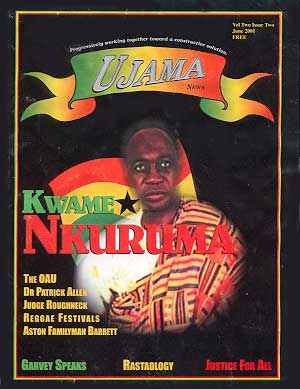
Dr Patrick Allen, a native of Jamaica-born in the Warika Hilis area off Windward Road, Kingston, holds a Undergraduate Degree from Springfield College B.S. in Biology and a Post-Graduate Degree from the University of California Santa Cruz, Ph.D. in Molecular Biology. Dr Allen is a professor and research associate at the University of Colorado at Boulder and is one of the country's leading AIDS/HIV researchers. Working since 1995 as principal investigator on a $1.2 million National Institutes of Health study, Allen has been defining the HIV capsid structure (the region containing the viral genetic material) and searching for ways to inhibit the deadly virus. Dr Patrick Allen is the only black scientist funded by the National Institute of Allergic and Infectious Diseases (Division of AIDS) to do AIDS/HIV research. Yet, more blacks suffer from the disease than any other group in the U.S.
Dr Allen founded the Black Biomedical Research Movement (BBRM) in order to increase the number of black researchers and to improve relations between the African American Community and the Biomedical field, thus heightening awareness and increasing the general level of consciousness on health issues within the black community. He promotes involvement in all aspects of biomedical research. The BBRM is a movement where health is the priority. He works with fellow scientists to encourage young African Americans to pursue research careers. Allen also organes a broad-based popular media awareness campaign and is pushing for legislative action that addresses these health issues.

HIV is just one of several health problems America's black community is vulnerable to. Other issues at the forefront include sickle cell anemia, hypertension, diabetes, prostate cancer, heart disease and infant mortality. The AIDS epidemic has hit an increasingly disproportionate number of blacks, but less than one percent of U.S. biomedical researchers are black. The most likely person to be infected today (in the United States) is a black woman 18-25 years old," Allen said. He and CU colleague Larry Gold hold a 1997 patent for creating specific RNA binding sites to inhibit HIV
"With few black researchers and few black participants in drug research, there needs to be a cultural shift so the black community gets involved in biomedicine," Allen said. "A history of fear and suspicion in the black community toward the biomedical establishment is adding to a major public health problem. In the last 10 years, HIV has really affected the black community, and to not have any doing the research ... it definitely affects the work in the labs." Allen said "I'm trying to raise a black health-consciousness thing. You have to start somewhere, because if you don't, the legacy of health problems is just going to get worse. It's a disturbing legacy already. The annual HIV infection rate for black men is six times that for white men, while the rate for black women is 14 times that for white women, and 80% of the infants born with the HIV virus are Black," he said.
The black community has historically distrusted the medical research com- munity. Most recently, the nation's attention was captured by details of the so-called Tuskegee experiments, which were conducted on black men with syphilis from 1932 to 1972. Those conducting the experiments deliberately withheld treatment from the men. But that's just one example of a national legacy of abusive research on black people. It has kept black people away from being researchers themselves, which in turn has created a sense of opposition. That separation is what Allen is trying to overcome. "There aren't a lot of blacks in science, but if there were more, you wouldn't have so much of a feeling of 'them against us," he said. The model Allen has in mind, is get- ting black people involved in Bio- medical Research and encouraging them to focus on health issues of par- ticular concern to blacks.
He's contacted everyone from come- dian Chris Rock to U.S. Surgeon General David Satcher, trying to enlist them in a long-term battle to raise awareness in the black communi- ty, both to encourage new researchers and to get black people just to think about their health. "Black people def- initely know that blood sugar, blood pressure, various cancers, are big, big problems in the black community, but they're the least likely people to go to free health fairs," Allen pointed out. "You have to get them thinking like that." 'I want the nation to say this is important, and for black people to realize it," Allen said.
At the present time Dr Patrick Allen is working on getting some funding from the National Institutes of Health (NIH) through the University of Colorado to write a grant to fund the training of all minority students from the 7th grade straight up to undergraduate and graduate school level in the field of Biomedical Research. He already has a commitment from Howard Hughes Medical Institute to match whatever funds are raised for grant money from the NIH.
This year from June 15th- 17th at the Juneteenth Celebration in Denver, Colorado, the BBRM will be kicking off its first Health expo, a Black Health Symposium. There will be interactive stations each focusing on every health issue affecting the black community and the correlation between diet and health.
THE BLACK BIOMEDICAL RESEARCH MOVEMENT:
The specific objectives of the Black Biomedical Research Movement are to aggressively promote Black health consciousness and involvement in all facets of biomedical research. Our hope and ideals are essentially the same as those of the U.S. Department of Health and Human Services and the National Institutes of Health, in trying to reduce health disparity in minority populations and increase the pool of NIH funded minority scientists, respectively.
In addition to the impressive list of ongoing traditional efforts at HHS and NIH that target these issues, BBRM will use very non-traditional approaches to show Black people that our health and longevity should be priority issues in our everyday lives.
Furthermore, our disfranchisement from biomedical research is directly related to our poor health. Black people, in the United States, have a perilous legacy of health problems that continues to worsen with each generation.We suffer the brunt of all health disparities, yet we are least represented in every aspect of biomedicine.
In 1998, U.S. Congress made a historical request for a state-of-emergency because of the devastating impact of HIV/AIDS on the Black community in this country. President Clinton and Secretary Shalala declared a state-of-crisis, and federal funds were released to help relieve this crisis.
Early in 1999, ABC Nightline reported on a study published in the New England Journal of Medicine that clearly demonstrates racial disparity in medical diagnosis. It suggested that our health care providers diagnose the same medical condition differently, based on race.
Healthy People 2000/2010 is a federal initiative to eliminate health disparity in minority populations of the United States. How do we expect to eliminate health disparities when there is disparity in the way the system of medicine diagnoses our health problems? How can we eliminate health disparity with the deep-rooted fear, mistrust, suspicion and lack of confidence that the Black community holds for the biomedical research and health care system? How can we ever expect to eliminate health disparity in ten years when the disgraceful third- world infant mortality rate among america's black people remains persistent?
We applaud all efforts aimed at improving the health of the black community and increasing involvement in biomedicine. We recognize their importance and realize that these efforts are crucially important for resolving these Black health problems. However, there is a serious and urgent need for a cohesive and coordinated Black health campaign. We need to be aware of Black health problems and learn how to identify and control them. Our religious leaders and political leaders and community leaders need to push Black health real hard. And especially our leaders in popular culture (Michael Jordan, Spike Lee, Chris Rock, Oprah Winfrey, Jay Z, Wu Tang Clan, DMX, Ziggy Marley, Culture, Bounty Killer, Capleton and others) need to push Black health to the fullest.
Health has to become a priority for us, only then can betterment be expected. Our personal health should be the first thing we think about. We can live longer, healthier lives-Black people. Four-hundred years ago, when we were being brought here, we were strong, fit, healthy, vibrant people. (That is without mention of the stringent "survival of the fittest" screen that was inherent to the process; many failed to survive the treacherous journey from Africa). Today, we are among the sickest people in this country. This does not make me proud to be black. It does not matter if you are illiterate or Harvard educated; and it does not matter if you are poor and destitute or if rich and well-celebrated and you are on television every day; and it does not matter if you are Christian or Muslim or Democrat or Republican, in jail or on the streets, if you are Black, diabetes, sickle cell anemia, AIDS, hypertension, infant mortality, asthma, heart disease and certain types of cancer will always be our problem, know that.
I am doing this for Black People, my people.
I am trying to preserve Black People,
400 years ago when we were brought here
from Africa we were the healthiest
set of people, right now we are
the sickest ones.
I want Black people to know that.
- Dr Patrick Allen




















